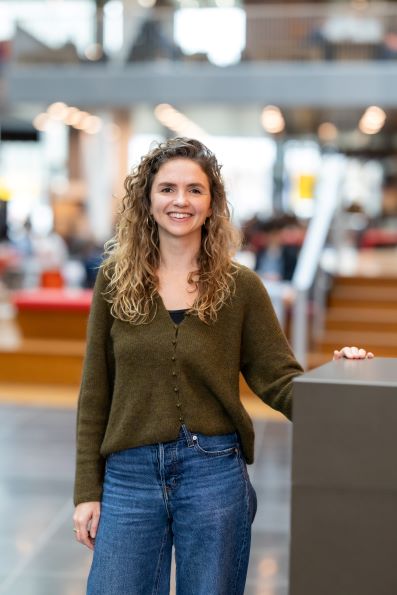How do you like your role?
"Very much! Working in student wellbeing means doing work that genuinely makes a difference in students’ lives. Attention to student wellbeing really increased during the covid-19 pandemic. That’s when we launched the student wellbeing survey, which led to real improvements. I was still with the International Office at the time, but I was already involved, and gradually took on more responsibilities related to student wellbeing."
What does your role as student wellbeing coordinator involve?
"I’m responsible for the Student Wellbeing project, which consists of 19 colleagues from various parts of the university, including faculties and different service departments. These include study advisors, student psychologists, students themselves, deans, and also (junior) lecturers. The project addresses student wellbeing in the broadest sense. For example, it includes monitoring student wellbeing through biannual surveys conducted with the Trimbos Institute, organising the annual Student Wellbeing Week, hosting panel discussions with students, and ensuring that our support services are visible and accessible to students."
How are you involved in social safety?
"The Student Wellbeing project, which began in 2021 and has now concluded, included a strong focus on social safety. This included awareness campaigns and preventive training on issues students encounter regularly, such as sexual harassment, racism, and discrimination. We’re now evaluating what worked well and determining what elements should be carried forward into standard university operations. Collaboration with colleagues across VU Amsterdam remains key.
I also coordinate training sessions for student confidential advisors within study and student associations within VU Amsterdam. These students take on an additional role, acting as a point of trust for their peers. The trainings - delivered by confidential counsellors and a trainer from the Centre for Teaching and Learning of VU Amsterdam - cover topics such as: What can you expect in this role? What are and aren’t your responsibilities?"
Why has social safety received more attention within VU Amsterdam?
"What happens in society is closely reflected within our university. Movements like Black Lives Matter and MeToo have brought a great deal to light, shining a spotlight on previously overlooked issues. This has led to greater national awareness around transgressive behaviour, and naturally, that awareness has carried over into VU Amsterdam.
Our goal is to ensure that all students can study in a safe environment and reach their full potential. And when socially unsafe situations do occur, students need to know they can seek help and know exactly where to go within VU Amsterdam."
How can social safety for students be further strengthened at VU Amsterdam?
"From the perspective of student wellbeing, we want to place more emphasis on preventing social insecurity. We’ve noticed that certain types of reports increase during specific times of the academic year. We want to address those moments with targeted awareness campaigns, aligned with key points in ‘the student journey’. We’re also planning to offer training sessions, co-created with students, for example through student panels. That way, our initiatives can be more tailored to students’ actual needs. We also aim to collaborate with external experts in the areas of sexuality, racism, and discrimination."
How do you view the role of students themselves in fostering social safety?
"Students have a responsibility to understand and uphold our shared values and standards. I believe we could do more to clearly communicate the core principles of the Code of Conduct of VU Amsterdam and make them more visible in education and social safety activities. It’s important for every student to understand how we interact with one another here and what is expected, especially given our diverse student body with many cultural backgrounds.
When unwanted behaviour occurs, students should feel empowered to take action. That might mean addressing the person responsible directly. If that feels too difficult, they can speak with a study advisor. And bystanders have a role too. Suppose you witness one student discriminating against another, or inappropriate behaviour between a lecturer and a student. In those cases, it’s important to take responsibility, even if it feels uncomfortable. It’s too easy to say, 'That’s not my problem,' when in reality, silence makes you part of the situation. Bystanders share in the responsibility for ensuring a safe learning environment. And when situations can’t be resolved informally, it’s crucial that students know where to turn to for support within VU Amsterdam."
What is the impact of polarisation on social safety at VU Amsterdam?
"Especially in times of growing polarisation, it’s essential for us at VU Amsterdam to reaffirm our core values. Polarisation can make things more difficult. Freedom of expression, for example, can become a sensitive issue. But that’s precisely why we need to talk about it. When opinions differ, we should be engaging with one another, not avoiding the conversation.
Moreover, as VU Amsterdam, we strive to be a socially engaged and diverse university that embraces a plurality of perspectives. That’s why initiatives like the Mixed Classroom are so important. It’s designed to help lecturers create an inclusive learning environment, one in which students can safely explore and learn from each other’s viewpoints."
